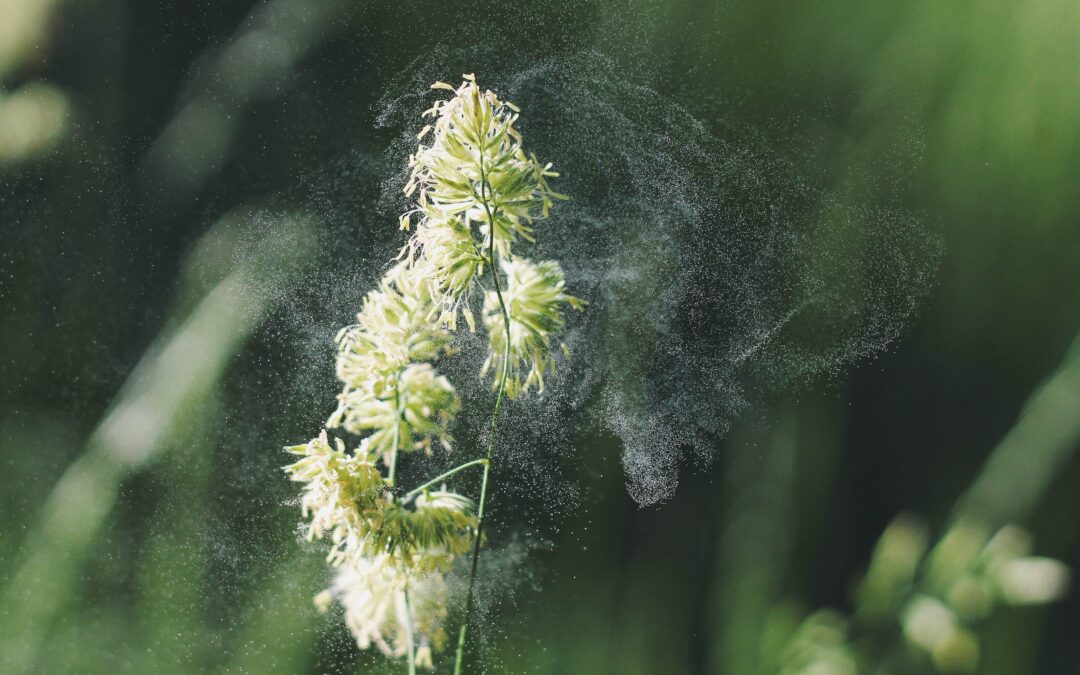Spring can be a time of running outside in the grasses, enjoying the spring rains, sneezing and dealing with a stuffy nose from allergies. For many, spring is the allergy season. The snow in some areas melts away and rains become more frequent, which results in the earth holding more water. The body parallels this shift by also holding onto more water in springtime. This can congest the mucus membranes that line the respiratory and digestive tracts. After months of dryness from winter, the mucus membranes can easily produce reactive and excessive mucus.
In Ayurveda, we must follow a seasonal diet with foods in season to counteract the imbalances of the season, such as allergies. The spring seasonal harvest provides bitter roots, leafy greens, and berries that can work as an antidote to congestive issues. Eating foods not in season (i.e. from across the world) can lead to allergies, digestive issues, and a compromised immune response to the pollen of spring. Below are our tips that can help prevent seasonal allergies if following a spring seasonal diet.
Our Tips to Prevent Seasonal Allergies
- Avoid congestive foods.
We suggest avoiding all refined and processed foods, as well as excessively salty and sweet foods. We also suggest reducing dairy and wheat. This means less deep-fried foods, cold beverages, ice cream, cheese, canned foods, and leftovers. These foods will congest your sinuses and digestive system and result in excessive mucus formation. They thereby can worsen allergies and reduce your immunity. Beans can be good for the spring season, but make sure to use asafoetida to reduce gas and bloating.
- Eat more dark leafy greens.
We suggest filling half of your plate with green, spring vegetables at your meals. This will help clear out the digestive tract and give you needed vitamins. Some great greens are: dandelion, kale, spinach, and red chard.
- Sip hot water throughout the day during spring.
Seasonal allergies can be brutal on the body’s ability to stay hydrated. Drinking lots of water, and sipping hot-warm water helps to flush out your system and support the elimination of foreign irritants. Hydration thins out mucus and supports sinus drainage. Sinus congestion also can lead to dry mouth and the decrease in protective saliva, which could lead to risks of dental issues. Drinking adequate water is important for overall health!
- Use raw, local honey.
Local, raw honey may help you develop immunity to local pollen. This is similar to how immunity shots work. Honey is best to buy from a farmer’s market to make sure it is local and raw. The drawback is honey can only work on pollen allergies. For other naturopathic resources visit your local health foods store.
- Eat lots of vitamin-C rich foods.
Vitamin C blocks the release of histamine from inflammatory cells. It also can help boost your immunity.
- Citrus fruits (grapefruits are in season, but can also be oranges and lemons)
- Brussel sprouts
- Papayas
- Broccoli
- Bell peppers
- Kale
- Drink 2-3 cups of dandelion root tea a day.
Dandelion root is an amazing bitter! It is a spring-harvested bitter rhizome that offers antioxidant support for healthy liver function and detoxification
- Try using a neti pot.
The neti pot traces back to early yogic practices to clear the breathing passages. The little pot is used to pour warm water and neti salt into one nostril at a time to clear the nasal passageways. It works to wipe out the inflammatory build-up in your sinuses.
The neti pot works best if you don’t already have a lot of congestion, as it can be slightly hard if you have mucus blockage in your nasal passage. If the water doesn’t flow easily you probably have some build up. This tends to happen to those who suffer from chronic allergies and it represents an accumulation of inflammatory material, which needs to be removed. Gently relax and inhale slightly through the nostril you are cleaning to help the water flow upward and eventually out of the other nostril. Do both sides. We suggest the use of the neti pot throughout the allergy season.
- Try to eat 2-3 meals a day with limited snacks.
If you need a snack, go for some fresh fruit like oranges or grapefruits. Try to avoid sweets and snack foods with sweeteners. This will help reduce toxin build-up and can help you fully digest and assimilate the nutrients in your food.
- Massage your face.
A simple, but highly effective way to feel better when dealing with allergies is to give yourself a face massage. Use oil and press on the areas next to your nose and move towards the base of your cheek bones near your mouth. Also, pressing under the eyebrow and moving towards your temple can feel nice if suffering from an allergy-induced headache.
- Up your spices.
Ayurveda suggests for springtime to use more spics to heat up the body and remove mucus. Some great spices and roots for this time are black pepper, cinnamon, garlic, turmeric, and ginger.
Our final tips are:
Avoid sticky hair products as pollen can stick to it.
Rinse your face well to remove any pollen from the day.
Use hot water when doing laundry to remove allergens
Consider exercising indoors on very high-pollen days, which tend to be warm, dry, windy days.
We hope you start to feel better in spring, so you can be outside more and enjoy the sunshine!
3.30.2022
